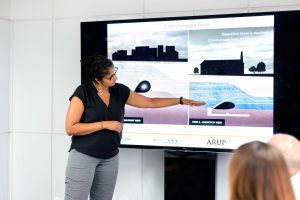What Engineering Recruiters are Really Looking For

Is your engineering job search going nowhere? Read on to find out how you can make your resume and cover letter more attractive to recruiters.
By: Jeff Perry | Founder of More Than Engineering
Hey there, amazing and brilliant engineer…
You know you are special. You have the skills to pay the bills. You can run circles around everyone you work with in your technical prowess, automation wizardry, and your overall analytical awesomeness.
You know how great you are for those roles you have been eyeing for six months, but the recruiters at that company don’t seem to care or acknowledge that about you, and you keep getting rejected over and over again…
Tired of not landing interviews?
Get our free 3-step guide to writing better resume bullet points, featuring 70 ideas for metrics you can use!
Einstein (yes, that Einstein) once said – “The definition of insanity is doing the same thing over and over again and expecting different results.”
You’re not insane, you’re brilliant! So you know you must do something different.
But what?
A Common Mistake

If your method of applying for jobs isn’t gaining you any traction, take some advice from one of the the greatest minds in history and switch it up! Photo by Andrew George on Unsplash
As a career coach for engineers, I get to help purpose-driven engineers make intentional career transitions. This means that when we work together they are not just looking for a new job, they want the right job.
Yet they often go about trying to land it in the wrong way – by only focusing on how awesome they are.
In resumes, networking conversations, and even in interviews they are prepared to share all the details about the amazing projects they’ve done, the money they saved their companies, and how much faster they work than the next engineer.
Yet, they still do not get hired.
Why? Every single communication opportunity was only about them! About what they wanted, could do, and why they were great. Recruiters do not want to hear that!
At least, they don’t want to only hear about that.
How to Be Different

To position yourself at the head of the pack, focus on how you will help the organization solve a problem or save money. Photo by ThisisEngineering RAEng on Unsplash
To be successful in landing your next role, it is important to understand what a recruiter or hiring manager is really looking for – someone who can solve a problem in the organization.
They don’t just want to hear that you can write in all the software languages, design in CAD like a boss, run the needed analysis, or work with cloud computers, they want to know how you will help the company reach their specific goals.
Do you know what the problems are for the people you hope will hire you? Is it a technical issue they need specific expertise in? Did someone leave the company, which opened a void in work that needs to be done? Is the company growing rapidly and in need of people to help reach new and aggressive goals? Is there a shift in the industry? Something else?
For example, I recently helped an engineering operations professional land a new job. The company reached out to him because of how he had optimized his online profiles, but then it really got interesting. They originally thought that they just needed a site manager, and this posted role was going to be WAY below what he was worth. This came out early in the discussion (with the CEO no less), but they were willing to continue the conversation.
In the ensuing interviews, he actually helped them expand their vision of what they truly needed and what was possible for filling this role, and he helped them see how he could help them move beyond their level of operations. Not only could he solve their current problems, but he identified possible future problems and communicated how he would help them with those as well!
The company recrafted the role, increased the pay and responsibility, and hired him.
Simply put, the more you understand why they need to hire someone, the better you can communicate in a way that shows that you are the person that can solve their problem.
You change your communication from focusing on how awesome you are, to how awesome you can help make them! See the difference? You want to help them succeed, and if hiring you will help them do that, then great.
Putting It Into Practice
To make this switch, your resume, cover letter, and every conversation with someone in this potential organization needs to be focused on learning and understanding what their problem is and showing that you have the ability to help them solve it.
A few example resume bullet points include:
- Led team of four (4) Structural Analysis Engineers and integrated their work statements and customer airline support project schedules resulting in 95% on-time completion of deadlines and 90% first-pass quality
- Designed and led the project for a new continuous duty high horsepower frac pump with a $1M budget and potential first year revenue of $8M
- Implemented team processes, technological improvements, and integration activities that resulted in a 70% reduction in ERP support tickets
- Turned the project around from the client wanting to replace the system to receiving frequent praise on functionality at all levels
Notice each of these examples show specific, measurable deliverables that these people were able to deliver for their companies or clients. That’s the impact you bring to the table, and that’s the kind of impact that a prospective employer is wanting from you too!
Brilliant, right? Definitely not insane (thanks, Einstein), because it’s truly different from how most people approach job search interactions.
Go Make it Happen
Take a breath.
Pause for just a moment at each step of the way. Truly examine the LinkedIn profile of the person you’re trying to reach out to. Thoroughly read the job description of the role. Go beyond the company website.
Spend a bit more time trying to understand what they are trying to accomplish, and how your skills and passions might help them be successful.
Then execute your strategy with a focus on them, not you.
See what happens!
About the Author
Jeff Perry is a leadership/career coach for engineers, building mindsets, leadership, and career intentions to unlock hidden potential and remove self-imposed roadblocks for career and life. For years, he has had the pleasure of supporting engineers and software pros, from new grads to director level. Having been on the front lines in the technical world, he has been able to map out the necessary skills for becoming a quality leader in the field.
You can connect with Jeff on LinkedIn or visit his website. Jeff also has a new, FREE, on-demand training course for engineers who are job searching or in job transitions. You can see it here.
Ready for more job search help?
Sign up for a free Senior Writer Resume Critique to see what's holding you back from landing interviews. One of our top professional resume writers will give you personalized feedback on the top 3 items you can improve based on our expert practices!
